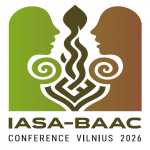A New Year’s Message on Diversity, Inclusion, and Professional Behavior
The 49th IASA Conference took place in Accra, Ghana from 1 to 4 October 2018 under the theme Access and Accessibility - Archival Policies and Barriers in the Age of Global Information Exchange. This gathering truly embodied the notion of global information exchange as it was attended by delegates from 29 countries. From the Opening Ceremonies to the Closing Banquet, delegates were treated to engaging cultural events, professional site visits, educational workshops and tutorials, and an incredibly diverse program of spoken papers from wide ranging perspectives and situations. The Executive Board is grateful for the hard work that Judith Opoku-Boateng and her team at the Institute of African Studies did in being such welcoming and graceful hosts.
Now we start planning for the new year. On 30 September – 3 October 2019, IASA will hold its 50th Anniversary Conference in Hilversum, Netherlands. We will hold this conference in conjunction with CCAAA’s Joint Technical Symposium, which will be held on 3 – 5 October. With such a significant milestone in the Association’s history, we will be celebrating the past 50 years of leadership in sound and audiovisual preservation. However, it is a great opportunity to look forward and imagine the future. If you will indulge me, I would like to describe the future that I imagine.
As I mentioned before, the 49th Conference in Accra was a gathering of a diverse range of people. It was, in my opinion, one of the most heavily representative conferences from the perspective of the researcher. We in the archival field are deeply concerned with the handling, treatment and processing of our materials, which will always constitute a large portion of our Association’s initiatives. Our training endeavors and our technical documents serve the sound and audiovisual community with the standards and best practices needed in the profession. However, these standards and best practices contain greater meaning when viewed through the optics of both the materials’ creators and users.
IASA has always served the professional archival and library community, audiovisual industry, academia, and the private collector. And, historically, IASA has done very well in creating an inclusive community. But with our eyes and ears on preserving the world’s cultural heritage through sound and audiovisual materials, IASA is poised to be the standard bearer for cultural heritage preservation for all who have stories to tell and those who need their stories saved.
Therefore, I imagine IASA’s future to be an association centered on inclusion to the benefit of what UNESCO calls “knowledge societies” (https://unesdoc.unesco.org/ark:/48223/pf0000141843). The four principles that UNESCO established to describe an equitable knowledge society are cultural diversity, equitable access to education, universal access to information, and freedom of expression. Using these principles as guides, I see IASA as a diverse and inclusive association within these domains:
- Diverse fields – Instead of creating an exhaustive list of disciplines, IASA is the association for all who create, use, manage and preserve sound and audiovisual documents. This includes the care of historical documents and the care of new documents at their creation.
- Diverse membership – IASA is the home to institutions and individuals of creators, users, managers and preservationists of all nationalities and cultural origins. Fostering translations of our publications and leveraging the Ambassador Programme to provide outreach and communication are just two ways we can reach and serve all communities.
- Inclusive access – IASA will be a safe and respectful association that welcomes all people regardless of age, race, colour, gender identity, sexual preference, religious belief or lack thereof, political persuasion or national origin. While this is stated in our Code of Conduct (https://www.iasa-web.org/code-conduct), it is important to restate and keep this foremost in our agenda. IASA will ensure that its Code of Conduct is available to all conference attendees throughout the conferences moving forward (not just available on the website as has been the case in the past).
- Inclusive dialog – All members and conference delegates have a voice in IASA. Participation shall always be open, respectful, and honest. This dialog must be two-way. IASA instructs the community and IASA learns from the community.
It is in this spirit that I invite you to celebrate our 50th Anniversary Conference in Hilversum. It is also in this spirit that I invite you to get involved with all aspects of IASA year-round. Our success as an association depends on your voice and participation.
Wishing you all a happy, collaborative, and productive 2019!
Imagine the future.
Toby Seay
IASA President
January 2019
- Toby Seay's blog
- Log in to post comments


